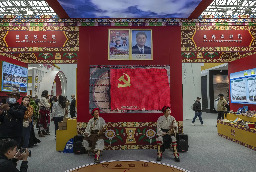China is slowly erasing Tibet's namelocked


feddit.de
Cross-posted from: https://feddit.de/post/5651275
Original link: https://www.newsweek.com/china-changing-tibet-english-name-1843391
You are viewing a single comment


Cross-posted from: https://feddit.de/post/5651275
Original link: https://www.newsweek.com/china-changing-tibet-english-name-1843391
@zerfuffle transliterations still belong to the transliterating language, eg "Bombay" or "Peking" may not sound English but they are.
It's unclear from the article what the Tibetan government-in-exile spokesperson would like it to be called.
The god king of a ethnostate with enshrined caste system and slavery? I don’t really care what he thinks.
The spokesperson is hardly a god king.
Ah, so he’s not the god king, just the representative of the god king in absentia, thanks for clarifying that for me. Doesn’t change that I don’t respect anyone who represents or is integrated into a caste-based ethnostate, but it’s good information nonetheless.
Sure, I'm not asking you to respect anything in particular.
The only placenames mentioned in the article are Chinese or English.
Got me wondering what the actual Tibetans would call it (both those inside Tibet and those outside it).
That's fair, but I think it loses the distinction between different transliteration strategies. For example, phonetic transliteration preserves far more of the original language than other methods. Transliteration is a necessary component of language: most common languages lack glottal stops and clicks, but it's still important to be able to refer to places that are named with glottal stops and clicks.
In that regard, the TAR has always been referred to as Xizang in Chinese because the TAR covers the Ü-Tsang region. The lands of greater Tibet from the peak of the Tibetan Empire are now parts of Qinghai, Sichuan, Arunachal Pradesh, Sikkim, Kashmir. The unified region of greater Tibet has, in recent history, always been དབུས (Ü) and གཙང་ (Tsang). This is pronounced ue-tsang according to Tibetan Pinyin (phonetic transcription) and Xizang according to transliteration - running through the possibilities, I'm struggling to find an exonym in Mandarin that would be closer in pronunciation.
The traditional name of the region is བོད་ (Bhö). The name Tibet is itself an import from the English. Given the degree of funding the Tibetan government-in-exile receives from the US (an English-speaking country), I'd suggest that the Tibetan government-in-exile has a strong financial incentive for maintaining English...
@zerfuffle the exiles seek the political goodwill of other nations, so presumably they also have a strong incentive to be intelligible to people in those nations. Would be interesting to know if they call it Bhota when they are in India.
When I am fundraising I use names people recognise.
Absolutely, there's a good point.
Doesn't change the fact that ethnic Tibet and the TAR are not necessarily the same territorial entity. Tibetans make up a significant proportion of the population of Qinghai, for example.